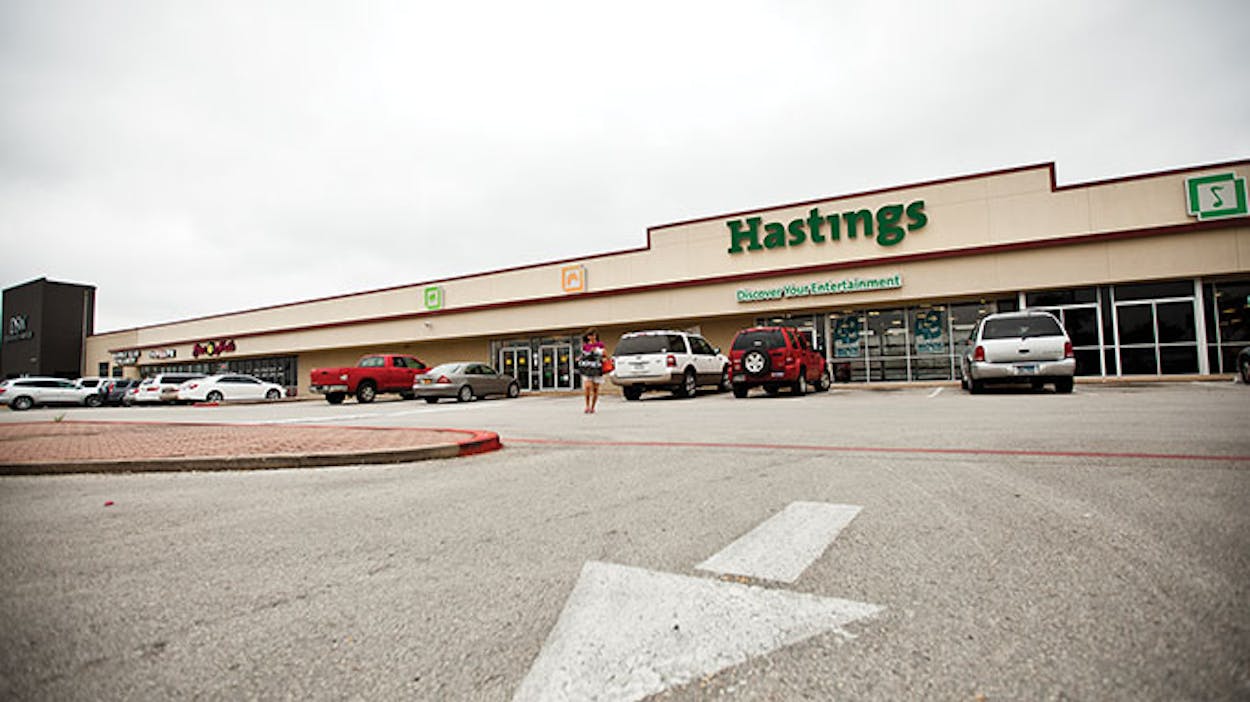The College Station of my late-seventies adolescence had its share of record shops—mall mainstays like Musicland and mom-and-pops that came and went. But Hastings Entertainment was a destination. Its megastore in the Culpepper Plaza strip center, a short bike ride from my home, became the place to while away summer afternoons and shed discretionary income in proportions that only a teenager with part-time employment as a dishwasher could justify. With few other financial responsibilities, I quickly established a pattern of browsing, planning, and then bingeing as each paycheck hit the bank. Sometimes I spent close to two weeks’ worth of wages in a single day buying the latest albums from Styx or Foreigner or Rush.
So a lump rose in my throat when I heard in mid-July that Amarillo’s Marmaduke family had sold the Hastings chain to the New Jersey merchandising mogul Joel Weinshanker for a measly $21 million. The inevitable move marks a big fall from the heady days of the nineties, when the Marmadukes’ retail expertise was sought after by Walmart and Hastings first went public, with visions of opening as many as five hundred stores.
Founded in 1968, Hastings has always focused on small to midsize markets, where the competition from big-box chains is minimal. You wouldn’t find a Hastings in Houston or Dallas, but you would find one in towns like Conroe, Lake Jackson, and Waxahachie. There, the stores’ selection of music and books (and later DVDs and video games) and a smattering of T-shirts, comic books, and gag gifts provided bored teenagers with endless hours of browsing. At its peak, the chain operated 154 stores across the country.
Today there are 126. The juggernaut of online commerce that clobbered Tower Records, Blockbuster, and Borders has left Hastings reeling. The one bright spot in the company’s fourth-quarter earnings report was a 15 percent rise in the sale of toys, gifts, and licensed merchandise. Weinshanker, who owns the merchandising rights to Marilyn Monroe, Muhammad Ali, and Elvis Presley, may see the remaining Hastings locales as a way to sell “Float Like a Butterfly” T-shirts and bobblehead likenesses of the King. Or he may simply be eyeing Hastings as a real estate play. He did tell the Amarillo Globe-News that he plans to upgrade the stores and add locations, although he also acknowledged that “if a store doesn’t work, it won’t continue.”
One thing’s for sure: in small-town America, record stores are on their way to being as much a part of the past as Woolworth’s or the drive-in theater. These days, pretty much everything that could be found at Hastings can be bought on Amazon, stored on an iPhone, and shared via Dropbox. Even if Weinshanker figures out how to save Hastings, it will never again be what it was. No future generation will know the joy of biking through the blistering Central Texas heat and slipping into the cool embrace of Hastings while the Knack or Blue Öyster Cult chases away the summer doldrums.








